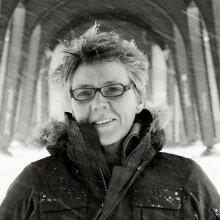Nederlands ►

Esther Kinsky was born in Engelskirchen. A year after her birth, however, her family left this municipality. It is the beginning of a nomadic way of life: Kinsky has lived in London, later moved to Battonya, Hungary and currently lives in Berlin. She studied Slavic Languages & Cultures and English in Bonn and Toronto. Since 1986 she has worked as a literary translator from Polish, Russian and English. In 2009 she was awarded the Paul-Celan-Prize for her translations.
Her first novel Sommerfrische (The Summer Vacation) and her first volume of poetry Die ungerührte Schrift des Jahrs (The Unstirred Writing of the Year) appeared with Matthes & Seitz in 2010. The first section 'Banat' – a term used for the border region between Romania, Serbia and Hungary – opens with the poem ‘Great Winter’: ‘the birds/fell out of the/apricot trees, the small/bodies sounded like toys/ when they hit/ through the hard/snow crust’.
Apart from the image of frozen birds falling off branches, or knocked off of them by children, something that returns in all of her work, border or fringe territories frequently make their appearance, whether it is the edge of the road, the train platform, a canal, the world.
It is as if Kinsky wants to turn our gaze to what would otherwise escape our attention. She situates her poems in nature, both plant and animal life play an important role. Not to lament them as a lost world or lose herself in the beauty of nature. To the contrary; nothing in these poems is embellished or made palatable. Nature represents an inner state. In her work, she is concerned with many of the major themes in a human life. A grave illness, for example, such as in Naturschutzgebiet (2013): ‘named liver flower/because of the resemblance of its petals/to the shape of the human organ’.
Or the farewell and death of her husband in Am Kalten Hang (The Cold Slope, 2016): ‘you raised your hand to say/such as they blossom in may’. In the background, echoes from Franz Schubert's Die Winterreise can be heard, alluding to the strange one or the figure of the stranger, another recurring theme in Kinsky's poetry and prose.
In March 2016, Kinsky received the Adelbert Von Chamisso Prize for her whole oeuvre, and in particular for her novel Der Fluss (The Flood, 2014).
Bibliography
Mali. Gildenstern, Bad Honnef, 1987
Unser fremdes Land: Tansanisches Reisebilderbuch (Our Foreign Land: Tanzanian Travel Picture Book), Gildenstern, Bad Honnef, 1987
Wer hat hier Angst vor Hexen? (Who's Afraid of Witches?), Gildenstern, Bad Honnef, 1989
Sommerfrische. (The Summer Vacation), Matthes & Seitz, Berlin, 2010
Die ungerührte Schrift des Jahrs (The Unstirred Writing of the Year), Matthes & Seitz, Berlin, 2010
Banatsko, Matthes & Seitz, Berlin, 2010
Eines Abends im Winter (One Winter Evening), illustrated by Sarah Fricke, Jacoby & Stuart, Berlin, 2011
Aufbruch nach Patagonien (Leaving for Patagonia), Matthes & Seitz, Berlin, 2012
Der Käptn und die Mimi Kätt (The Capt'n and the Mimi Cat), illustrated by Gerda Raidt, Jacoby & Stuart, Berlin, 2012
Fremdsprechen. Gedanken zum Übersetzen (Strange Speaking. Thoughts about Translation, Matthes & Seitz, Berlin, 2013
Naturschutzgebiet (Protected Natural Area), poems and photo’s, Matthes & Seitz, Berlin, 2013
Am Fluss (On the River), Matthes & Seitz, Berlin, 2014
Karadag Oktober 13. Aufzeichnungen von der kalten Krim (Karadag October 13. Notes About the Cold Crimea) with Martin Chalmers, travelogue, Matthes & Seitz, Berlin, 2015
Am Kalten Hang (The Cold Slope), Matthes & Seitz, Berlin, 2016

